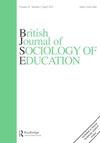Tracking and educational inequality: a longitudinal analysis of two school reforms in Switzerland
IF 2.1
3区 教育学
Q1 EDUCATION & EDUCATIONAL RESEARCH
引用次数: 0
Abstract
Abstract This paper examines the effects of different forms of tracking on learning inequalities in compulsory education. We use longitudinal monitoring of four cohorts of students over a four-year period, from their entry into secondary 1 education until they enter secondary 2 education. Our data include 18,706 students. We use multilevel regression analyses to test the effects of different forms of tracking after controlling for students’ sociodemographic and academic characteristics, and for contextual factors. Our results suggest not only that the effect of tracking is a composition effect or a peer effect, but that tracking per se explains a significant part of the variance in learning in the two educational contexts in our study. Our results confirm that educational policies and institutions play a pivotal role in the construction of learning inequalities and social reproduction through school in contemporary societies.追踪与教育不平等:对瑞士两次学校改革的纵向分析
摘要本文考察了不同形式的跟踪对义务教育中学习不平等的影响。我们对四组学生进行了为期四年的纵向监测,从他们进入中一教育到进入中二教育。我们的数据包括18706名学生。在控制了学生的社会人口统计学和学术特征以及情境因素后,我们使用多水平回归分析来测试不同形式的跟踪的效果。我们的研究结果表明,跟踪的影响不仅是作文效应或同伴效应,而且跟踪本身解释了我们研究中两种教育背景下学习差异的重要部分。我们的研究结果证实,教育政策和机构在当代社会通过学校构建学习不平等和社会再生产方面发挥着关键作用。
本文章由计算机程序翻译,如有差异,请以英文原文为准。
求助全文
约1分钟内获得全文
求助全文
来源期刊
CiteScore
3.70
自引率
9.50%
发文量
74
期刊介绍:
British Journal of Sociology of Education is one of the most renowned international scholarly journals in the field. The journal publishes high quality original, theoretically informed analyses of the relationship between education and society, and has an outstanding record of addressing major global debates about the social significance and impact of educational policy, provision, processes and practice in many countries around the world. The journal engages with a diverse range of contemporary and emergent social theories along with a wide range of methodological approaches. Articles investigate the discursive politics of education, social stratification and mobility, the social dimensions of all aspects of pedagogy and the curriculum, and the experiences of all those involved, from the most privileged to the most disadvantaged. The vitality of the journal is sustained by its commitment to offer independent, critical evaluations of the ways in which education interfaces with local, national, regional and global developments, contexts and agendas in all phases of formal and informal education. Contributions are expected to take into account the wide international readership of British Journal of Sociology of Education, and exhibit knowledge of previously published articles in the field. Submissions should be well located within sociological theory, and should not only be rigorous and reflexive methodologically, but also offer original insights to educational problems and or perspectives.

 求助内容:
求助内容: 应助结果提醒方式:
应助结果提醒方式:


